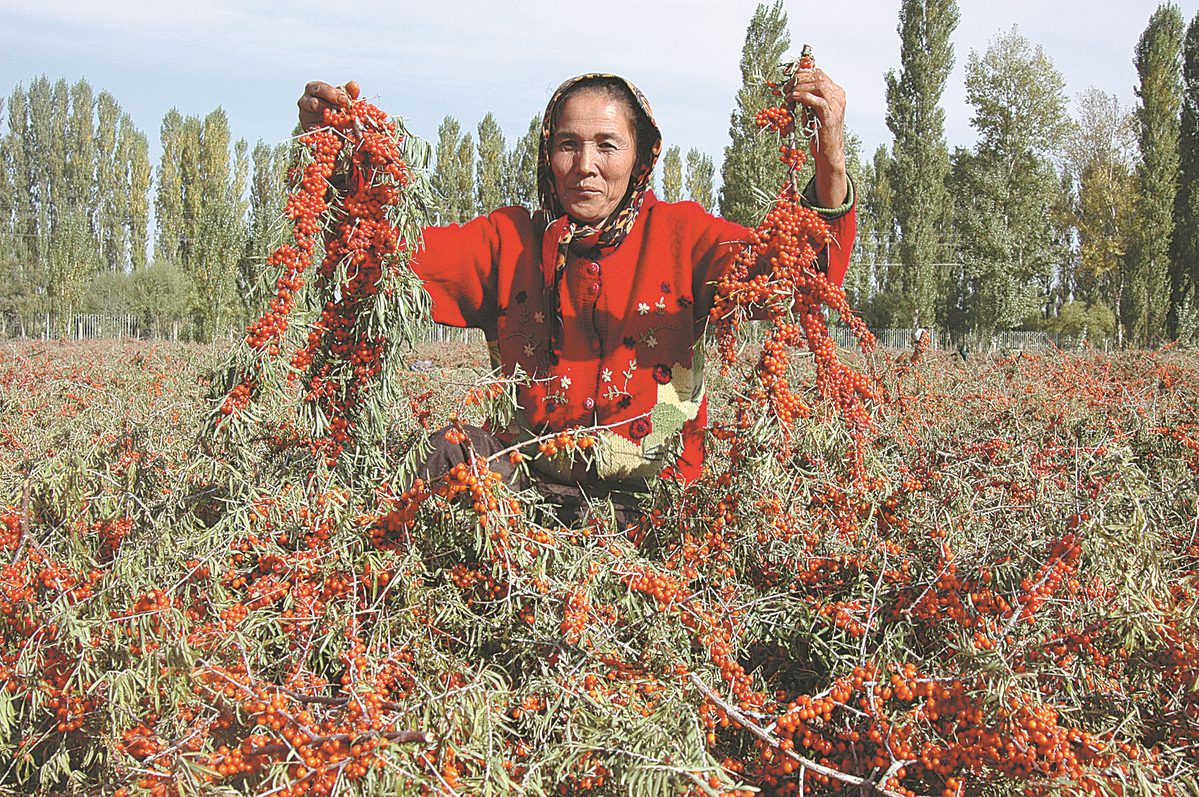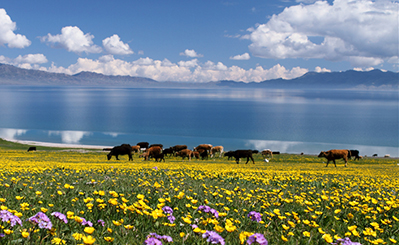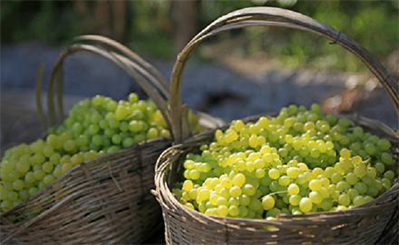Sea buckthorn boon for county in desert

A woman displays her crop of sea buckthorn berries on a farm in Wushi county. [Photo/China Daily]
Sea buckthorn plantations are giving Wushi, a county of deserts and mountains in the Xinjiang Uygur autonomous region, a new lease on life.
The arid climate and poor quality of its soil used to make agriculture a tricky proposition in Wushi.
Sea buckthorn, however, is resistant to wind, drought, cold weather, and saline and alkali soils, and its fruits, rich in vitamins, antioxidants and anti-inflammatory substances, can be used to make health supplements.
This is why the county has been developing a sea buckthorn industry to boost economic development and improve the environment. Efforts have been made to propagate high-yield varieties, expand cultivated areas and improve processing facilities, as well as develop sales channels.
The crop is now grown on 13,333 hectares and produces an annual yield of 10 metric tons of fruit. By 2025, Wushi plans to have 20,000 hectares under cultivation.
For the last five years, Zhao Ying, an agricultural expert, has been invited to the county to help breed improved strains of the fruit.
"We've set up Xinjiang's largest, most technologically advanced propagation base in Wushi. It is capable of growing some 10 million sea buckthorn seedlings a year, with a value of 20 million yuan ($3 million)," Zhao said. "This brings the county ecological and economic benefits."
Two years ago, the county government invested 35 million yuan in setting up a sea buckthorn nursery covering nearly 190 hectares in Ahya town, which provides work to around 30 residents from nearby villages.
Nisagul Samat, who is from Ahya, is one of the beneficiaries of sea buckthorn. "I had doubts about whether planting sea buckthorn would help me make money," she said. "Initially, I was reluctant to get involved."
However, after Zhao and her colleagues visited Nisagul, offering her free seedlings and providing instructions on how to grow the plant, her worries disappeared. Nisagul began growing sea buckthorn near her house and earned about 8,000 yuan selling the fruit last year.
The profitable business has encouraged more villagers to get involved.
"Some 20 farming households have come to express their willingness to grow sea buckthorn," Zhao said. "If each household can grow an average of 10,000 sea buckthorn shrubs, they can earn around 20,000 yuan a year."
This year, her team aims to propagate 5 million sea buckthorn shrubs using a tissue culture technique and a further 6 million from plant cuttings, which is expected to bring in about 15 million yuan.
"Think about it. By growing sea buckthorn we can turn the Gobi Desert into an oasis and help farmers have better lives," she said. "I'm highly motivated."
Wushi's thriving sea buckthorn industry also helps drive tourism. The county has been trying to turn itself into a popular health tourism destination and forge a reputation as the hometown of sea buckthorn in China.
For instance, a sea-buckthorn-themed culture and tourism festival was held in September, during which visitors were able to appreciate an exhibition of paintings featuring the plant, savor local delicacies, look around an exhibition of cultural and creative products, and pick sea buckthorn fruit. Troupes were also invited to put on song and dance performances to attract more visitors.
Askar Tohti, head of Wushi, said that the event was staged to revitalize the county's tourism and encourage the stable development of the sector, which would help boost employment and increase incomes, driving rural vitalization.
"Sea buckthorn could be the sparkle that attracts more tourists," he said.
He added that Wushi has launched an app that allows users to access travel information, find recommendations for travel routes and book services online, bringing added convenience to tourists who want to travel around the county.
 Attractions
Attractions Dining
Dining Culture
Culture